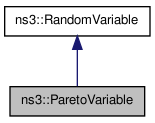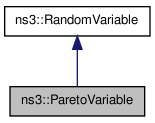ParetoVariable distributed random varThis class supports the creation of objects that return random numbers from a fixed pareto distribution. It also supports the generation of single random numbers from various pareto distributions. More...
#include <random-variable.h>


Public Member Functions | |
| ParetoVariable () | |
| Constructs a pareto random variable with a mean of 1 and a shape parameter of 1.5. | |
| ParetoVariable (double m) | |
| Constructs a pareto random variable with specified mean and shape parameter of 1.5. | |
| ParetoVariable (double m, double s) | |
| Constructs a pareto random variable with the specified mean value and shape parameter. Beware, s must be strictly greater than 1. | |
| ParetoVariable (double m, double s, double b) | |
| Constructs a pareto random variable with the specified mean value, shape (alpha), and upper bound. Beware, s must be strictly greater than 1. | |
| ParetoVariable (std::pair< double, double > params) | |
| Constructs a pareto random variable with the specified scale and shape parameters. | |
| ParetoVariable (std::pair< double, double > params, double b) | |
| Constructs a pareto random variable with the specified scale, shape (alpha), and upper bound. | |
Detailed Description
ParetoVariable distributed random var
This class supports the creation of objects that return random numbers from a fixed pareto distribution. It also supports the generation of single random numbers from various pareto distributions.
The probability density function is defined over the range [  ,+inf) as:
,+inf) as:  where
where  is called the location parameter and
is called the location parameter and  is called the pareto index or shape.
is called the pareto index or shape.
The parameter  can be infered from the mean and the parameter
can be infered from the mean and the parameter  with the equation
with the equation  .
.
ParetoVariable x(3.14); x.GetValue(); //will always return with mean 3.14 ParetoVariable::GetSingleValue(20.1); //returns with mean 20.1 ParetoVariable::GetSingleValue(108); //returns with mean 108
Constructor & Destructor Documentation
| ns3::ParetoVariable::ParetoVariable | ( | double | m | ) | [explicit] |
Constructs a pareto random variable with specified mean and shape parameter of 1.5.
- Parameters:
-
m Mean value of the distribution
| ns3::ParetoVariable::ParetoVariable | ( | double | m, | |
| double | s | |||
| ) |
Constructs a pareto random variable with the specified mean value and shape parameter. Beware, s must be strictly greater than 1.
- Parameters:
-
m Mean value of the distribution s Shape parameter for the distribution
| ns3::ParetoVariable::ParetoVariable | ( | double | m, | |
| double | s, | |||
| double | b | |||
| ) |
Constructs a pareto random variable with the specified mean value, shape (alpha), and upper bound. Beware, s must be strictly greater than 1.
Since pareto distributions can theoretically return unbounded values, it is sometimes useful to specify a fixed upper limit. Note however when the upper limit is specified, the true mean of the distribution is slightly smaller than the mean value specified.
- Parameters:
-
m Mean value s Shape parameter b Upper limit on returned values
| ns3::ParetoVariable::ParetoVariable | ( | std::pair< double, double > | params | ) |
Constructs a pareto random variable with the specified scale and shape parameters.
- Parameters:
-
params the two parameters, respectively scale and shape, of the distribution
| ns3::ParetoVariable::ParetoVariable | ( | std::pair< double, double > | params, | |
| double | b | |||
| ) |
Constructs a pareto random variable with the specified scale, shape (alpha), and upper bound.
Since pareto distributions can theoretically return unbounded values, it is sometimes useful to specify a fixed upper limit. Note however when the upper limit is specified, the true mean of the distribution is slightly smaller than the mean value specified.
- Parameters:
-
params the two parameters, respectively scale and shape, of the distribution b Upper limit on returned values
The documentation for this class was generated from the following file:
- src/core/random-variable.h
 1.7.1
1.7.1